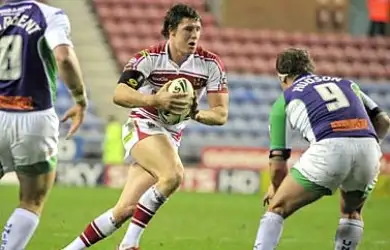Wigan’s love affair with rugby union

Joel Tomkins’ move to snub England in the Four Nations, followed by the confirmation that he had joined rugby union side Saracens, is not a unique story. In fact, Tomkins is just the latest in a line of Wigan players to make the switch from rugby league to ‘the dark side.’
More intriguingly, his younger brother Sam has been chosen to play for the Barbarians when they face Australia on Saturday. It will be the third time in four weeks that Tomkins has played Australia in two separate sports.
The most successful cross code converts are arguably Jason Robinson or Chris Ashton. Andy Farrell, British rugby league’s answer to the Argentine footballer Diego Maradona, couldn’t replicate for Saracens the success Robinson portrayed for Sale and England.
Robinson left Wigan after losing the 2000 Super League Grand final, and five months later was coming off the substitute’s bench to the tune of Swing Low, Sweet Chariot against Italy in the Six Nations.
It was Robinson who scored England’s only try in the 2003 Rugby Union World Cup (note the word, union) and in 2006 became the first player to win both the English Premiership and Super League Grand Final.
Chris Ashton walked out of the door without resistance at Wigan in 2007. After rising through the academy and impressing in his first and second seasons in the cherry and white, he remarkably lost form before announcing he had signed for Northampton Saints. He made his rugby union debut in November of that year after being released from Wigan early.
In 2010 he made his England debut against France during the Six Nations He toured with England down under before returning to score his first international try against the Wallabies at Twickenham in the autumn international series.
Ashton made history in the following year’s Six Nations when he became the first Englishman to score four tries in a Championship match for 97 years.
Ashton has made the swallow dive his own trademark action for being such a prolific try scorer. Both he and Robinson proved that support play learnt in rugby league from an early age has proved to be detrimental for opposing teams.
Fitness levels are much higher in rugby league that any player who finds space in a rugby union match is guaranteed to score. Robinson proved this point many times during his career.
Meanwhile Andy Farrell proved that not all cross code converts take to rugby union the same way. There is no doubt he struggled to adapt, but was still good enough to represent England in the 2007 World Cup. In fact Farrell won eight caps for England, which for a convert flop is not a bad effort.
But should all this worry the fans of rugby league? We know rugby union have money to spend when it comes to the finances. But the fact union have been poaching players from Wigan for over a decade, with a third of these adapting and becoming successful, shows that youth systems in rugby union are worthless. We haven’t even started on non-Wigan players such as Shontayne Hape, Lesley Vainikolo and Iestyn Harris for Wales.
Joel has the chance to show what the youth system in rugby league can produce. If he can emulate the achievements of Chris Ashton and Jason Robinson then maybe, just maybe, people from outside the heartlands of our sport may sit up and take notice. Finally!